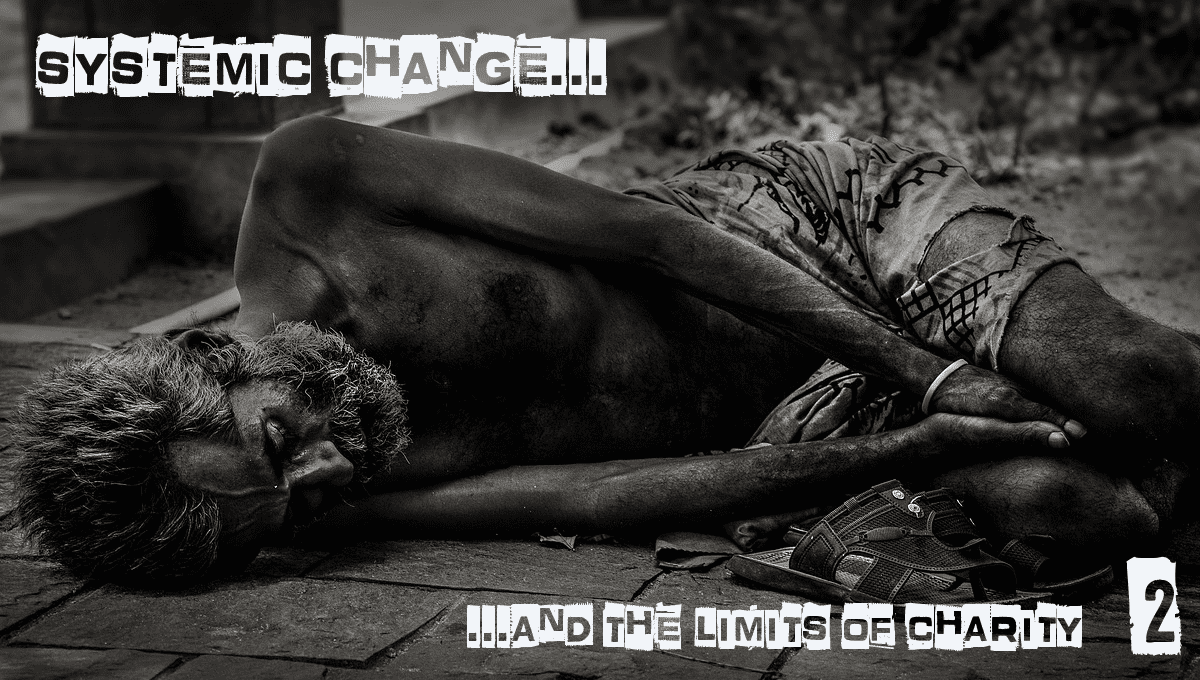Does charity choke justice? On the Limits of Charity (part 2)
David Hilfiker, a veteran of decades of direct service with the poor, raised questions 15 years ago in a 2001 article from The Other Side magazine exploring the tension between charity and justice. This is the second of a two-part reflection on his writings.
Symptoms or the problem of injustice
At another level, the fundamental problem for the poor in our country is not homelessness or AIDS or hunger or the like—or even any combination of these. They are just symptoms; the problem is injustice.
In promoting our institutions, it is natural to emphasize the importance of our own project. But this can lead to subtle impressions that if we just distribute enough food, or create enough bed space, or find enough homes—that is, if we just treat the symptoms—we will have solved “the problem.”
Charity does little to change the wider social and political systems that sustain injustice.
I am not, or course, suggesting that we abandon charity.
As an adjunct to justice, charity is both necessary in our current situation and a requirement of our faith. But we must acknowledge the broader implications of our charity and recognize that it alone is not enough.
We need to start thinking about ways for our charitable organizations to support those who work for justice.
- Our promotional materials, for example, must at least refer to systemic factors, recognizing that charity is not the solution.
- We must be careful about comparing our work to, or even alluding to, the “inefficiency” of government programs.
- We must offer our volunteers reading materials, seminars, and discussion opportunities about the systemic issues. By putting themselves into face-to-face contact with the poor, they have taken an important first step. We need to encourage them to continue the journey.
- We must include education as part of our mission. This can mean talking about larger issues in our newsletters and donor appeals. Perhaps it will result in a few people dropping their financial support, but that is the type of risk our organizations need to take.
- We must engage in political advocacy. By law, tax-exempt organizations are able to use portions of their budget for advocacy. What if every social ministry dedicated five percent of its budget, freeing up time for staff to preach sermons, to speak on justice issues in small groups at our churches, to testify before government commissions, to write letters to their newspaper, to call or write our elected representatives?
- We must get behind the effort to drastically change campaign financing. Though barred from supporting individual candidates, nonprofits can use this election year to emphasize that the United States will not be an effective democracy until the enormous influence of money on government decisions is reduced. “We the people” currently have little power to persuade our representatives to vote for justice.
Working for justice is messier and far less rewarding that charity.
There are no quick fixes, and the most common reason for quitting is discouragement. But we have little choice. Within an unjust society, there are limitations to our charity; we need to join others in the struggle for justice as well. It is a fundamental requirement of our faith.
The article which is the source of these reflections first appeared under the title “When Charity Chokes Justice” in “The Other Side” magazine in the September – October 2000 issue on pp 10 and following.
We invite you to read part one of this reflection, and also to read the Hilfiker’s full text and share your thoughts.








0 Comments